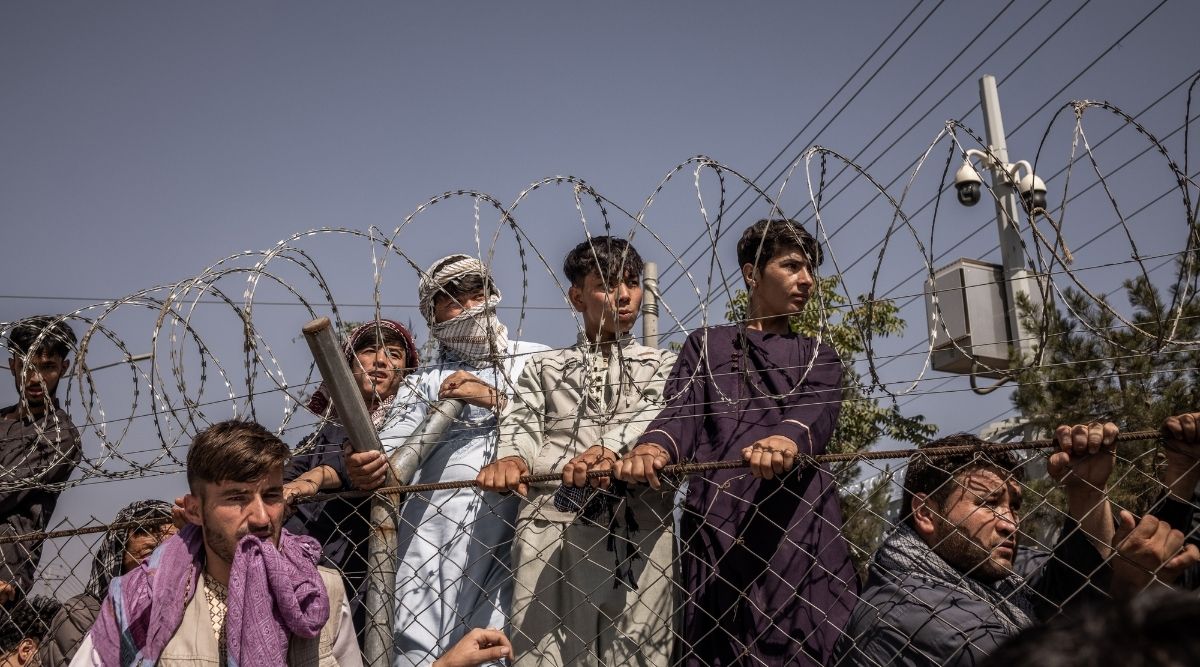 People gather in front of the international airport in Kabul, Afghanistan on Monday after the Taliban took control of the country. (Jim Huylebroek/The New York Times)
People gather in front of the international airport in Kabul, Afghanistan on Monday after the Taliban took control of the country. (Jim Huylebroek/The New York Times)
Written by Marc Santora, Carlotta Gall, Ruhullah Khapalwak and Nick Cumming-Bruce
As pressure mounted on the Biden administration to do more to evacuate thousands of Afghan allies fearing for their lives, the Taliban on Tuesday sought to present themselves to the world as responsible stewards of Afghanistan.
But with both the Biden administration and the Taliban promising to offer protection, for millions of Afghans the future promised only more uncertainty. While the U.S. military on Tuesday restored order within Kabul’s international airport, it was unclear whether Afghans could make it there.
Despite assurances of safe passage, the Taliban are not only known to operate with brutality, but also have a dismal history of managing a vast nation largely dependent on foreign aid.
The group’s leaders took to Twitter, appeared on international cable networks and held a news conference — all to provide assurances that they would not engage in systemic retribution and to offer vague reassurances to women.
“Give us time,” a spokesman said at the news conference in Kabul.
On Tuesday, the chairman of the Taliban’s Military Commission, Mullah Yaqoub, reiterated orders that fighters in Kabul should not enter people’s homes or seize property.
“No one is allowed to enter anyone’s house, particularly in Kabul, where we have entered recently and the situation is new,” he said.
But he coupled that with a warning, saying that the Taliban would be collecting weapons and government property in an organized manner and that looting state property was a betrayal of the country.
“If anyone is caught, they will be dealt with,” he said.
There were other signals that the Taliban are now seeking to move from being insurgents to the new legal authority in the nation.
Mullah Baradar, the chief of the Taliban’s political office, arrived in the southern city of Kandahar on Tuesday, returning to Afghanistan for what is believed to be the first time in a decade.
A Taliban delegation also was in Kabul on Tuesday for discussions with political leaders to negotiate the formation of an interim government, according to Maulvi Qalamuddin, a former Taliban minister who reconciled with the Afghan government long ago.
The delegation, led by Amir Khan Muttaqi, who served as the minister of higher education in the previous Taliban government, met with a coordinating council led by former President Hamid Karzai. More senior Taliban leaders are scheduled to arrive in Kabul on Wednesday and will most likely announce a new government, he said.
“They have been in the city for the last three days, and if the Taliban had wanted a one-sided government, they would have already declared an Islamic Emirate of Afghanistan yesterday in the presidential palace,” he said. “They would have announced their Cabinet, But no. In fact, they were waiting for this.”
Still, there were also ominous signs that the Taliban’s promises did not match the situation on the ground.
Taliban fighters spread out across the streets of Kabul, the capital, riding motorbikes and driving police vehicles and Humvees that had been seized from government security forces. Armed fighters occupied parliament and some visited the homes of government officials, confiscating possessions and vehicles, while others made a show of directing traffic.
U.N. Secretary-General António Guterres said Monday that his organization was “receiving chilling reports of severe restrictions on human rights” throughout the country. “I am particularly concerned by accounts of mounting human rights violations against the women and girls of Afghanistan,” he said at an emergency meeting of the Security Council.
In some areas of Afghanistan, women have been told not to leave home without being accompanied by a male relative, and girls’ schools have been closed.
The United Nations children’s organization, UNICEF, said the Taliban had appointed coordinators in various parts of the country to act as contact points for humanitarian groups. UNICEF representatives met with a health commissioner in Herat on Monday and said he had requested that female employees of the health department return to work.
But the agency reported getting mixed messages on education for girls: In some areas, local Taliban authorities said they were awaiting guidance from leaders, and in other areas they said they wanted schools for girls and for boys up and running.
“We are cautiously optimistic on moving forward,” Mustapha Ben Messaoud, UNICEF’s chief of operations in Kabul, said via video link.
The Afghan government’s collapse has left the Taliban in control of not only security, but also basic services in a country already facing a drought that has left a third of its 38 million people in danger of running out of food.
While there have been no confirmed reports of widespread reprisal killings, many people have sheltered in their homes.
Hoping to get people back to essential jobs, the Taliban issued a “general amnesty” on Tuesday for all government officials, saying that they could return to work with “full confidence.”
- The Indian Express website has been rated GREEN for its credibility and trustworthiness by Newsguard, a global service that rates news sources for their journalistic standards.

